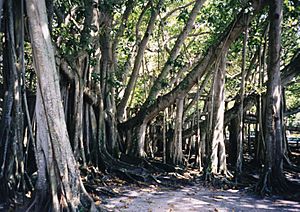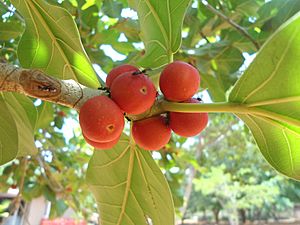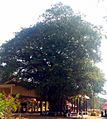Indian banyan facts for kids
Quick facts for kids Indian banyan |
|
|---|---|
 |
|
| An Indian banyan tree (Ficus benghalensis) in front of the Edison museum in Fort Myers, Florida | |
| Scientific classification | |
| Kingdom: | |
| (unranked): | |
| (unranked): | |
| Order: | |
| Family: | |
| Genus: | |
| Species: |
F. benghalensis
|
| Binomial name | |
| Ficus benghalensis |
|
| Synonyms | |
|
Ficus indica L. |
|
The Indian banyan is a very large tree that originally comes from the Indian subcontinent. Some of these trees in India are so big that their leafy tops (canopies) cover huge areas, making them some of the largest trees in the world!
How the Banyan Tree Grows
The Indian banyan tree, also known as Ficus benghalensis, has a special way of growing. It sends down roots from its branches. These are called aerial roots because they grow in the air. When these aerial roots reach the ground, they grow thicker and turn into strong, woody trunks. This makes the tree spread out very wide.
The tree also produces small fruits called figs. Birds like the Indian myna love to eat these figs. When birds eat the figs, the seeds pass through their bodies. This helps the seeds to sprout and grow into new banyan trees more easily and quickly. It's a great example of how plants and animals help each other!

Cultural Importance in India
The Indian banyan tree is very special in India. It is the national tree of India, which means it's an important symbol for the country. People in India also consider the banyan tree to be sacred, or holy. Because of this, you can often find temples built right under these trees.
The banyan tree's huge canopy provides a lot of shade. This is very helpful in hot places, offering a cool spot for people to rest. It's recognized as a national tree in both countries of the Indian subcontinent.
Images for kids
-
Ripe fruits of Indian banyan in Suhrawardy Udyan, Dhaka
-
In front of the Edison museum in Fort Myers, Florida, US
See also
 In Spanish: Ficus benghalensis para niños
In Spanish: Ficus benghalensis para niños
 | Aurelia Browder |
 | Nannie Helen Burroughs |
 | Michelle Alexander |




